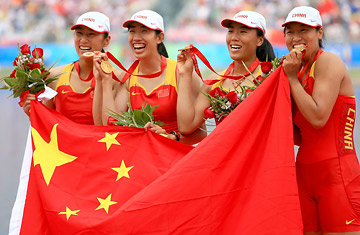
Tang Bin, Jin Ziwei, Xi Aihua and Zhang Yangyang of China celebrate their gold medal in the women's quadruple sculls rowing competition
Granted, there are 630 million of them. But practically everywhere you looked during these Beijing Games, there was another Chinese woman — and a few girls — with a gold medal slung around her neck. By Aug. 19, China's female Olympians had captured 23 of the country's 43 golds, nearly the same amount as the entire American team had garnered. (By contrast, female athletes have won only 11.5 of America's 26 gold medals. The half refers to the mixed team equestrian event.)
China's women have the legacy of Karl Marx to thank for their remarkable performance. Chairman Mao liked to say that "women hold up half the sky," and when the country began its state-sponsored project in the 1990s to cultivate gold-medal athletes, women were given more than equal treatment. In fact, China's Sports Ministry strategically focused on developing women's sports because they tend to be underfunded in most other countries. The People's Republic pours millions of dollars into developing everything from female marksmen to women wrestlers. "Chinese girls are willing to work harder and eat more bitterness than the boys," says Dong Jianqing, a judo coach at Qingdao Sports School in eastern China, one of the country's top state-run athletic academies. Dong should know about eating bitterness, the Chinese phrase describing an ability to withstand suffering and deprivation. He mentored several female judoka who went on to win Olympic medals at previous Olympics as well as at these Games.
In Beijing, female athletes from the People's Republic have struck gold in more than 10 disciplines, from weight lifting and shooting to archery and gymnastics. The nation's women even proved victorious in rowing's quadruple sculls, an Olympic event that China's sports czars only began targeting seriously a few years ago. The same goes for beach volleyball, in which the country's women placed ninth in Athens. This time around, China's red-bikini-clad sand spikers are guaranteed either gold or silver in the Aug. 21 final against the U.S. On Aug. 18 — the same day as when China's great male hope, hurdler Liu Xiang, flopped in the qualifiers — Chinese women quietly triumphed on the trampoline and uneven bars.
China isn't the only communist country to count on its women. Think of Eastern bloc athletes such as gymnasts Nadia Comaneci and Olga Korbut. But their male counterparts? They just didn't measure up in terms of Olympic glory. Even North Korea holds to the rule: both of its golds in Beijing have come courtesy of female Olympians.
The power of the X chromosome doesn't extend to other parts of Chinese society. With the relaxation of a government quota system, the number of women in the top ranks of civil service has plummeted. A traditional preference for boys over girls has led to widespread sex-based abortions, leaving China with one of the world's most lopsided gender ratios. In 2005, 118 Chinese boys were born for every 100 girls. That means fewer brides for a surplus of Chinese men in the coming decades — not to mention a deficit of future female Olympians.
